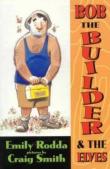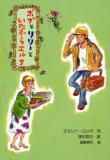AustLit
The material on this page is available to AustLit subscribers. If you are a subscriber or are from a subscribing organisation, please log in to gain full access. To explore options for subscribing to this unique teaching, research, and publishing resource for Australian culture and storytelling, please contact us or find out more.
Latest Issues
AbstractHistoryArchive Description
Bob the Builder is a very happy man until the day his nice, messy house is infested with elves. The elves tidy up Bob's house till it's horribly clean and bright. They even shine his working boots, polish his hard hat, and put fairy bread in his lunch box. His mates just laugh and laugh. Bob is so embarrassed! But with the help of Lily Sweet, the lady next door, he achieves a compromise, and lots of good things follow.
Affiliation Notes
-
This work is affiliated with the AustLit subset Asian-Australian Children's Literature and Publishing because it has a Japanese translation.
Publication Details of Only Known VersionEarliest 2 Known Versions of
Other Formats
- Also braille, sound recording.
Works about this Work
-
Construction Sites of Sexual Identity : A Reading of Emily Rodda's Bob the Builder and the Elves
2001
single work
criticism
— Appears in: Papers : Explorations into Children's Literature , December vol. 11 no. 3 2001; (p. 32-38) Parsons offers a comprehensive critique of gender roles in Emily Rodda's Bob the Builder and the Elves, and claims that the narrative is 'profoundly conservative' in its underlying promotion of heterosexual ideology (34-35). She points out that while children's literature has usually been perceived as 'innocent' of sexual politics, 'no text is innocent of ideology' and goes on to argue that in Rodda's text, '...the story's correlation of heterosexuality with correctness, normality and 'happily ever after' borders on the homophobic' (32). In his influential text, Language and Ideology in Children's Fiction, John Stephens says that literature is used to teach children 'how to live in the world' and in childrens' texts, representations of sexuality and gender often function at an unconscious level which reinforces the dominant hegemonic worldview (8). This is, says Parsons, 'ideology's most powerful aspect, its hidden nature and the subtley of its messages' and the job of children's literary criticism is to 'identify the ideological tensions in the texts we offer to children and balance these kinds of representations appropriately' and to encourage a society in which alternative sexualities are accepted and not alienated by social structures (38). -
Untitled
2001
single work
review
— Appears in: The School Librarian , Summer vol. 49 no. 2 2001; (p. 76)
— Review of Bob the Builder and the Elves 1998 single work children's fiction -
The Children's Book Council of Australia Annual Awards 1999
1999
single work
criticism
— Appears in: Reading Time : The Journal of the Children's Book Council of Australia , August vol. 43 no. 3 1999; (p. 3-12) -
Untitled
1999
single work
review
— Appears in: Reading Time : The Journal of the Children's Book Council of Australia , February vol. 43 no. 1 1999; (p. 25)
— Review of Bob the Builder and the Elves 1998 single work children's fiction -
Untitled
1998
single work
review
— Appears in: Magpies : Talking About Books for Children , September vol. 13 no. 4 1998; (p. 35)
— Review of Bob the Builder and the Elves 1998 single work children's fiction
-
Untitled
1999
single work
review
— Appears in: Reading Time : The Journal of the Children's Book Council of Australia , February vol. 43 no. 1 1999; (p. 25)
— Review of Bob the Builder and the Elves 1998 single work children's fiction -
Untitled
1998
single work
review
— Appears in: Magpies : Talking About Books for Children , September vol. 13 no. 4 1998; (p. 35)
— Review of Bob the Builder and the Elves 1998 single work children's fiction -
Untitled
2001
single work
review
— Appears in: The School Librarian , Summer vol. 49 no. 2 2001; (p. 76)
— Review of Bob the Builder and the Elves 1998 single work children's fiction -
The Children's Book Council of Australia Annual Awards 1999
1999
single work
criticism
— Appears in: Reading Time : The Journal of the Children's Book Council of Australia , August vol. 43 no. 3 1999; (p. 3-12) -
Construction Sites of Sexual Identity : A Reading of Emily Rodda's Bob the Builder and the Elves
2001
single work
criticism
— Appears in: Papers : Explorations into Children's Literature , December vol. 11 no. 3 2001; (p. 32-38) Parsons offers a comprehensive critique of gender roles in Emily Rodda's Bob the Builder and the Elves, and claims that the narrative is 'profoundly conservative' in its underlying promotion of heterosexual ideology (34-35). She points out that while children's literature has usually been perceived as 'innocent' of sexual politics, 'no text is innocent of ideology' and goes on to argue that in Rodda's text, '...the story's correlation of heterosexuality with correctness, normality and 'happily ever after' borders on the homophobic' (32). In his influential text, Language and Ideology in Children's Fiction, John Stephens says that literature is used to teach children 'how to live in the world' and in childrens' texts, representations of sexuality and gender often function at an unconscious level which reinforces the dominant hegemonic worldview (8). This is, says Parsons, 'ideology's most powerful aspect, its hidden nature and the subtley of its messages' and the job of children's literary criticism is to 'identify the ideological tensions in the texts we offer to children and balance these kinds of representations appropriately' and to encourage a society in which alternative sexualities are accepted and not alienated by social structures (38).
Awards
- 2004 YABBA — Hall of Fame
- 2000 winner COOL Award — Fiction for Younger Readers
- 2000 winner CYBER Awards — Younger Readers
- 1999 honour book CBCA Book of the Year Awards — Book of the Year: Younger Readers
Last amended 1 Mar 2017 16:07:47
Export this record





